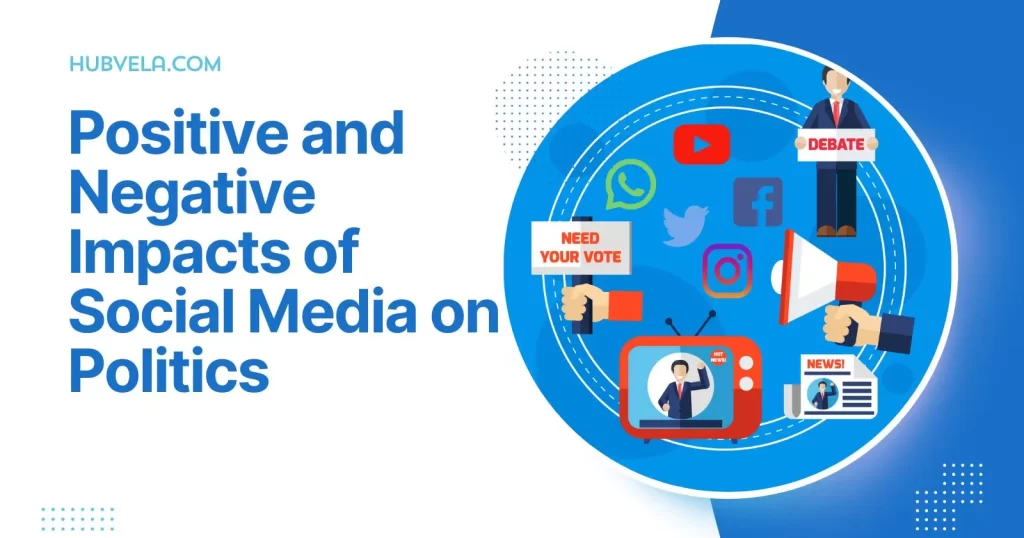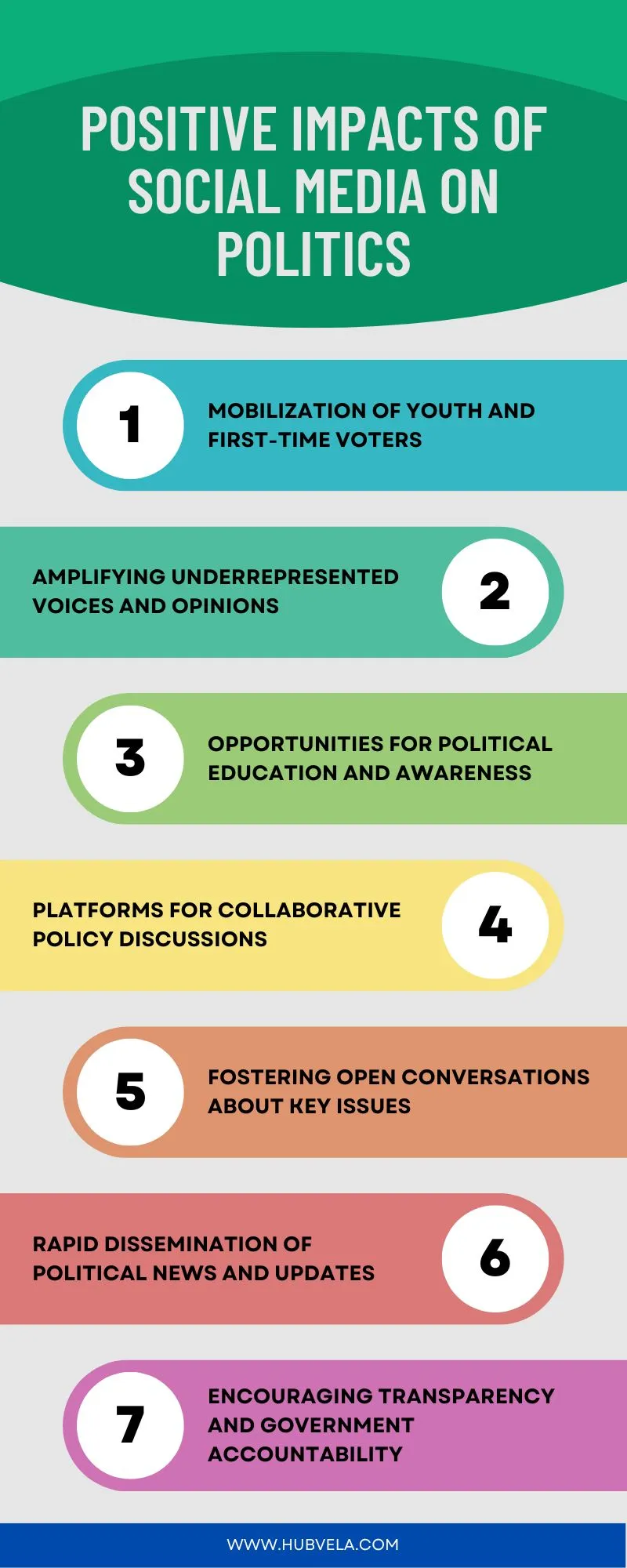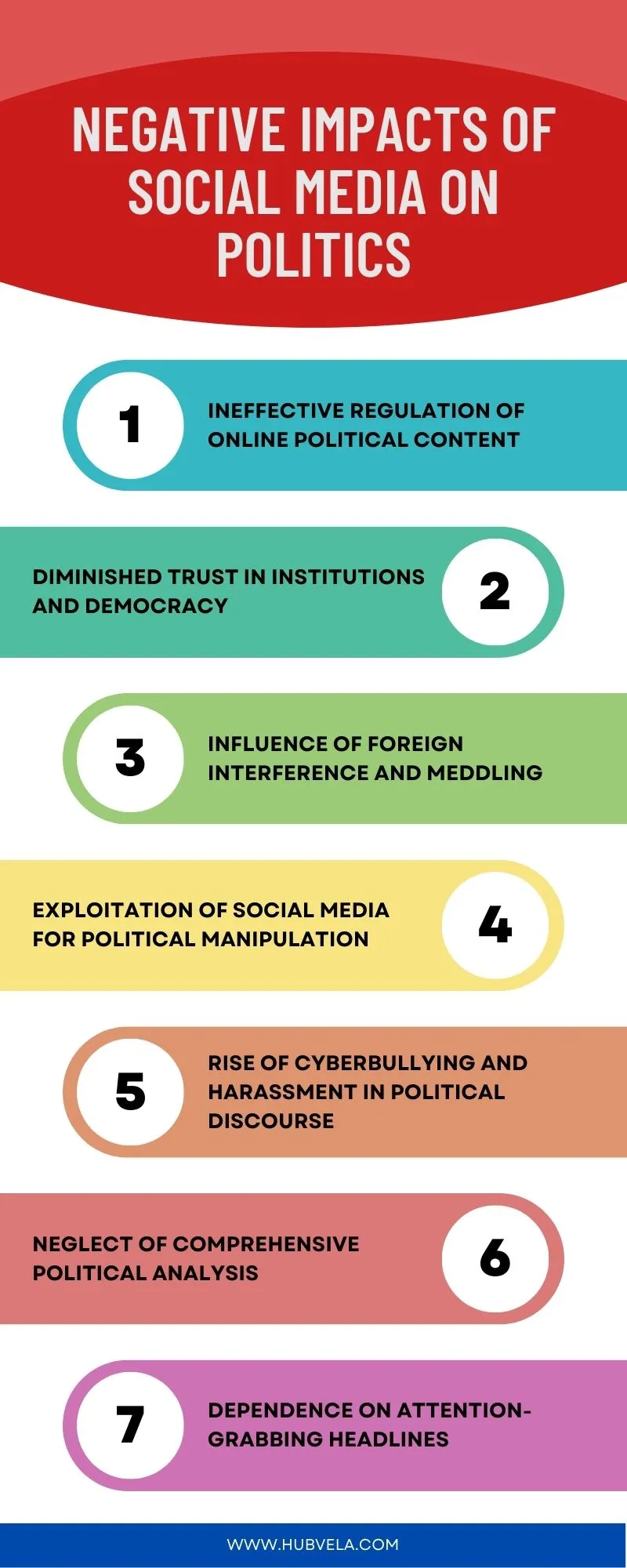Social media has become an integral part of our daily lives, and its impact on politics cannot be ignored. The emergence of social media platforms has enabled people to share their opinions on public issues unilaterally.
However, despite all the benefits of social media, an increased concern is being raised regarding its negative impact on politics.
According to a Pew Research Center survey, 64% of Americans say social media has a mostly negative effect on the way things are going in the U.S. today.
The public’s views on the positive and negative effects of social media vary widely by political affiliation and ideology.
Across parties, larger shares describe social media’s impact as mostly negative rather than mostly positive, but this belief is particularly widespread among Republicans. In this article, we will explore the positive and negative impacts of social media on politics.

--Advertisement--
Positive Effects of Social Media on Politics
Social media has become an integral part of modern-day politics. It has revolutionized the way people interact with politicians and political issues.
Social media platforms such as Facebook, Twitter, and Instagram have become powerful tools for political communication, mobilization, and engagement.
Despite the criticism that social media has received for its negative impact on politics, recent research has shown that social media has several positive effects on politics. We will explore the positive effects of social media on politics.

1. Mobilization of Youth and First-Time Voters
The mobilization of youth and first-time voters is an important aspect of the positive effects of social media on politics. Social media platforms have the potential to engage young adults in political discussions and activities, thereby increasing their political participation.
Studies suggest that social media can help young citizens develop skills and psychological dispositions that promote offline participation.
Additionally, social media platforms provide a space for young people to express their opinions, which is a key driver of political participation.
It has been observed that social media is more likely to impact non-institutionalized forms of participation, such as online activism and advocacy, rather than institutionalized ones like voting in elections.
However, social media can still play a significant role in mobilizing first-time voters by providing them with election-related information and non-partisan voter engagement efforts.
This is especially important for young people who may lack access to traditional outreach groups. Social media has the potential to mobilize and engage youth and first-time voters, contributing to a more inclusive and participatory political landscape.
2. Amplifying Underrepresented Voices and Opinions
Social media has the potential to amplify underrepresented voices and opinions in politics. Historically marginalized groups, such as African American and Latino/young people, can now discuss and get information about issues that affect their lives through social media networks and websites devoted to young people of color.
Social media can provide global access to organizations that can promote and increase visibility by sharing and networking, which can increase collaboration across diverse groups of people.
Digital devices and social media have shown significant potential for activists to mobilize the public, and document their activities, and the injustices they witness.
With social media, people can have a voice in their government every day, not just on election day, and governments around the world have a presence on Facebook.
By amplifying underrepresented voices and opinions, social media can help to create a more inclusive and representative democracy.
3. Opportunities for Political Education and Awareness
Social media has opened up new opportunities for political education and awareness. With the vast amount of information available on social media platforms, users can easily access news and information about political events and issues from a variety of sources.
This allows individuals to stay informed and engaged with the political process, which can lead to increased political participation. Additionally, social media provides a platform for individuals to express their opinions and engage in political discussions with others.
This can help to promote political dialogue and understanding, and can lead to the development of new ideas and perspectives.
Social media has the potential to be a powerful tool for political education and awareness, and can help to promote a more engaged and informed citizenry.
4. Platforms for Collaborative Policy Discussions
The use of social media platforms for collaborative policy discussions is an important aspect of the positive effects of social media on politics.
Social media serves as a modern-day public forum where voters can engage in political discourse, debates, fundraising, fact-checking, and news and results.
Social media platforms have the power to strengthen democracies by echoing public opinion and can be used by domestic opposition, external forces, and the governing regime for political purposes.
However, social media companies are often blamed for driving greater polarization by segmenting political audiences and fueling polarization, especially in established democracies.
Nonetheless, there are clear steps digital platforms can take to curb polarization and reduce divisiveness while strengthening democracy.
Social media platforms provide a unique opportunity for collaborative policy discussions and can be used to engage the public in political discourse.
5. Fostering Open Conversations About Key Issues
Social media can foster open conversations about key issues in politics by providing a platform for individuals to express their opinions and engage in discussions with others.
Social media can also provide access to a wide range of perspectives and information sources, allowing individuals to gain a more comprehensive understanding of political issues.
Additionally, social media can facilitate the organization of political events and movements, allowing individuals to mobilize and advocate for change. However, social media can also contribute to political polarization and the spread of misinformation.
It is important for individuals to critically evaluate information sources and engage in respectful and informed discussions to ensure that social media is used as a tool for positive political engagement rather than a source of division and misinformation.
6. Rapid Dissemination of Political News and Updates
The rapid dissemination of political news and updates through social media has both positive and negative effects.
On the positive side, social media allows for the quick and widespread sharing of political information, enabling citizens to stay informed about current events and political developments.
It provides a platform for politicians and political organizations to directly communicate with the public, bypassing traditional media channels. This can lead to increased transparency and accountability in politics.
Additionally, social media allows for the formation of online communities and discussion forums where individuals can engage in political discourse and share their perspectives.
However, the rapid pace of social media also contributes to the spread of misinformation and fake news. Misinformation campaigns on social media can manipulate public sentiment and views, leading to political polarization and instability.
It is important for users to critically evaluate the information they encounter on social media and verify its accuracy before sharing or believing it.
While social media has the potential to enhance political engagement and information sharing, it also poses challenges in terms of misinformation and the need for media literacy.
7. Encouraging Transparency and Government Accountability
The use of social media in government practices can promote transparency and accountability. Social media platforms can be used as a tool for constituents to engage with their elected representatives and petition them in a direct manner.
Over 60% of Americans report using the internet to access government information, and a well-crafted social media policy can set clear guidelines and expectations for board members, employees, and the public.
Transparency is essential for effective social media regulation, and without it, no other regulatory measures will be effective.
Governments can build social media and information and communication technologies (ICTs) into e-government transparency initiatives to promote collaboration with members of the public and the ways in which members of the public are able to employ the same social media to monitor government activities.
Promoting political transparency ensures that government actions are accountable, and local governments can use social media platforms to livestream public meetings and increase transparency.
The process of governing is most legitimate when it incorporates democratic principles such as transparency, pluralism, citizen involvement in decision-making, representation, and accountability.
Negative Effects of Social Media on Politics
Social media has become an integral part of modern life, with billions of people around the world using platforms such as Facebook, Twitter, and Instagram to connect with others and share information.
While social media has many benefits, such as facilitating communication and providing access to a wealth of information, there are also negative effects associated with its use. One area where social media has been shown to have a negative impact is politics.
According to a survey by Pew Research Center, 64% of Americans believe that social media has a mostly negative effect on the way things are going in the U.S. today. We will explore the negative effects of social media on politics.

1. Ineffective Regulation of Online Political Content
The ineffective regulation of online political content is a major concern when it comes to the negative effects of social media on politics.
While some argue that government regulation of social media companies might limit the spread of fake news and disinformation, others argue that such regulations might restrict individual speech or limit the right to curate the internet.
Social media can be a tool of suppression, used to disseminate distorted information and fake news, which can lead to a radicalizing effect when it occurs in weak democratic countries.
However, regulating free speech on social media is dangerous and futile, and the calls for regulating social media and technology companies are politically motivated.
Therefore, it is important to find ways to mitigate the political impacts of social media and digital platform concentration, such as promoting competitive markets for digital platforms and improving access to information for researchers and civil society organizations.
2. Diminished Trust in Institutions and Democracy
Diminished Trust in Institutions and Democracy is one of the negative effects of social media on politics. With the rise of social media platforms, there has been a decline in trust in traditional institutions and democratic processes.
Social media has provided a platform for the spread of misinformation, fake news, and conspiracy theories, which can erode public trust in established institutions such as the government, media, and political parties.
The ease of sharing and amplifying information on social media has made it difficult for users to discern between reliable sources and unreliable ones.
This has led to a polarization of opinions and a loss of faith in the democratic process, as people become disillusioned with the information they encounter on social media.
As a result, trust in institutions and the democratic system has been undermined, posing challenges to the functioning of a healthy democracy.
3. Influence of Foreign Interference and Meddling
The influence of foreign interference and meddling in politics through social media is a significant concern. Social media platforms have made it easier for foreign powers to manipulate and influence elections, even if their efforts are ineffective.
This interference can undermine the legitimacy of electoral outcomes and corrupt the integrity of political deliberation.
By connecting people worldwide, social media has provided authoritarian regimes with a means to connect to voters outside their borders and manipulate democracies.
While social media companies have made efforts to block authoritarian propaganda, voluntary measures are not enough to combat this issue.
The impact of foreign interference on elections can be substantial, with interventions often increasing the vote share of the preferred candidate by an average of 3 percent.
It is crucial for governments to consider legislative changes to address foreign meddling and regulate social media companies to protect the integrity of democratic processes.
4. Exploitation of Social Media for Political Manipulation
The exploitation of social media for political manipulation is a significant concern in today’s digital age. Governments, political parties, and public relations firms are using social media platforms to produce misinformation and disinformation on an industrial scale.
Authoritarians and populists around the world are taking advantage of human nature and computer algorithms to manipulate public opinion and influence elections.
These actors engage in various tactics, including planting and amplifying misinformation, targeting journalists and public figures for social engineering, and gaming trending and ranking algorithms.
The rise of social media manipulation has led to a decline in internet freedom, disruptions to mobile internet service, and attacks on human rights defenders and independent media.
This manipulation threatens expressive freedoms, civil rights, and the stability of social institutions. It is crucial to address this issue and develop strategies to combat the exploitation of social media for political gain.
5. Rise of Cyberbullying and Harassment in Political Discourse
The rise of cyberbullying and harassment in political discourse is a concerning trend that has been amplified by the widespread use of social media platforms.
With the ease of anonymity and the ability to reach a large audience, individuals are increasingly using these platforms to engage in aggressive and abusive behavior toward political figures and their supporters.
This toxic environment not only undermines healthy political discussions but also has a detrimental impact on the mental well-being of those targeted.
The negative effects of cyberbullying and harassment in political discourse can lead to the silencing of voices, the spread of misinformation, and the erosion of trust in the political process.
It is crucial for individuals, social media platforms, and policymakers to address this issue and promote a more respectful and constructive online political environment.
6. Neglect of Comprehensive Political Analysis
The neglect of comprehensive political analysis is one of the negative effects of social media on politics. Social media platforms are designed to provide users with quick and easy access to information, but this can lead to a lack of depth and nuance in political discourse.
Many people rely on social media for their news and political information, but the algorithms used by these platforms often prioritize sensational or emotionally charged content over more substantive analysis.
This can result in a polarized and fragmented political landscape, where people are more likely to engage with content that confirms their existing beliefs rather than challenging them.
The neglect of comprehensive political analysis can also lead to the spread of misinformation and fake news, which can have serious consequences for democratic institutions and public trust in government.
7. Dependence on Attention-Grabbing Headlines
Social media has become a popular pathway for people to get their political news, particularly among young adults.
However, this trend has led to a dependence on attention-grabbing headlines, which can be misleading and contribute to the spread of fake news, hate speech, and misinformation. Social media users who rely on it for political news tend to be less knowledgeable about major news stories and express less concern about the impact of made-up news.
The use of social media for news is positively associated with uncivil political discussion, which can fuel political polarization and intensify political sectarianism.
Therefore, the dependence on attention-grabbing headlines can have negative effects on politics, including the spread of misinformation and the intensification of political polarization.
Conclusion on Positive and Negative Impacts of Social Media on Politics
In conclusion, social media has both positive and negative effects on politics. On the positive side, social media can be a powerful tool for political mobilization and communication, allowing politicians to connect with their constituents and share their ideas with a large audience.
Social media can also serve as a source of political learning, providing users with access to a wide range of information and perspectives.
On the negative side, social media can contribute to the spread of fake news and misinformation, which can erode democratic norms and undermine public trust in political institutions.
Social media can also be a source of incivility and polarization in political discourse, as users may be more likely to engage in aggressive or hostile behavior online than in face-to-face interactions.
As such, it is important for policymakers and researchers to continue to study the impact of social media on politics and to develop strategies for mitigating its negative effects while harnessing its positive potential.


